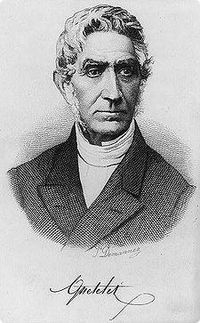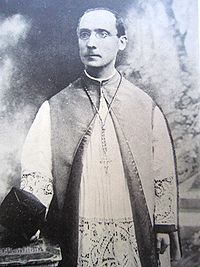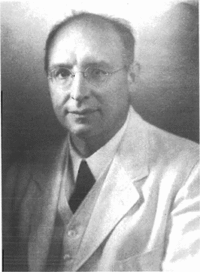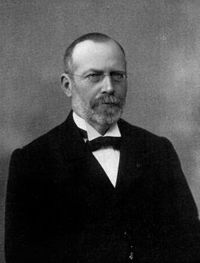Difference between revisions of "History of science in Belgium"
m |
m |
||
| Line 49: | Line 49: | ||
As a student of mathematics and physics, Sarton became interested in the history of science from a very broad philosophical and cultural point of view. After his studies, he devoted himself fully to the history of science. Sarton was the founder of the science journals ''[[Isis]]'' and ''[[Osiris]]''. | As a student of mathematics and physics, Sarton became interested in the history of science from a very broad philosophical and cultural point of view. After his studies, he devoted himself fully to the history of science. Sarton was the founder of the science journals ''[[Isis]]'' and ''[[Osiris]]''. | ||
<br/> | <br/> | ||
| − | [[File: Mansion. | + | [[File: Mansion.jpg|left|200px|Paul Mansion (1844-1919)]]In 1890, the history of mathematics and physics was also included in the curriculum of the science faculties of the state universities. The compulsory course was limited in scope and was assigned to a faculty member as an addition to his 'normal' assignment. |
Only in exceptional cases did the lecturer also conduct historical research himself, such as at the [[University of Ghent]], where the mathematics professor and active science historian [[Mansion, Paul (1844-1919)|Paul Mansion]] was responsible for the subject, and in [[University of Liège|Liège]], where [[Le Paige, Constantin Marie Michel (1852-1929)|Constantin Le Paige]] was in charge. The subject did not take off and was dropped from the compulsory curriculum in 1928, a few years later it was dropped altogether. | Only in exceptional cases did the lecturer also conduct historical research himself, such as at the [[University of Ghent]], where the mathematics professor and active science historian [[Mansion, Paul (1844-1919)|Paul Mansion]] was responsible for the subject, and in [[University of Liège|Liège]], where [[Le Paige, Constantin Marie Michel (1852-1929)|Constantin Le Paige]] was in charge. The subject did not take off and was dropped from the compulsory curriculum in 1928, a few years later it was dropped altogether. | ||
Only in [[University of Brussels|Brussels]] did the history of science remain as a free course until after the Second World War, with, among others, the very active science historian [[Pelseneer, Jean (1903-1985)|Jean Pelseneer]] as lecturer. | Only in [[University of Brussels|Brussels]] did the history of science remain as a free course until after the Second World War, with, among others, the very active science historian [[Pelseneer, Jean (1903-1985)|Jean Pelseneer]] as lecturer. | ||
| Line 68: | Line 68: | ||
|-align="left" valign="top" | |-align="left" valign="top" | ||
|} | |} | ||
| − | Even the establishment of the [[National Committee for | + | Even the establishment of the [[National Committee for Logic, History and Philosophy of Science]], under the auspices of the Académie royale des Sciences, des Lettres et des Beaux-Arts de Belgique and the Koninklijke Academie voor Wetenschappen, Letteren en Schone Kunsten van België, could hardly bring about progress: it essentially took over a number of activities from the Belgian Committee. In 1970, the complaint was still being made that the history of science was misunderstood by universities and therefore had no chance of academic development. None of the bodies and associations, however, took any action to change the situation. |
<br/> | <br/> | ||
<br/> | <br/> | ||
<div style="color:#DC143C;font-family:arial;font-style: normal; font-size:18px;font-weight: normal;text-align:left;letter-spacing: 3px">A promising future for the history of science </div> | <div style="color:#DC143C;font-family:arial;font-style: normal; font-size:18px;font-weight: normal;text-align:left;letter-spacing: 3px">A promising future for the history of science </div> | ||
| − | <br/>Since the 1980s, a new impetus emerged: scientific societies such as the [[National Committee for | + | <br/>Since the 1980s, a new impetus emerged: scientific societies such as the [[National Committee for Logic, History and Philosophy of Science]] and the [[Zuidnederlands Genootschap voor de Geschiedenis der Geneeskunde, Wiskunde, Natuurwetenschappen en Techniek]] - under the chairmanship of [[Bockstaele, Paul P. (1920-2009)|Paul Bockstaele]] - found new breath. |
Research groups were set up in almost all universities to study the history of the sciences from different angles. With the support of the university authorities, the academies and the [[NFWO (FWO-Flanders, F.R.S – FNRS)|National Fund for Scientific Research]], the history of science gained a modest place in scientific research in Belgium at the beginning of the 1990s. | Research groups were set up in almost all universities to study the history of the sciences from different angles. With the support of the university authorities, the academies and the [[NFWO (FWO-Flanders, F.R.S – FNRS)|National Fund for Scientific Research]], the history of science gained a modest place in scientific research in Belgium at the beginning of the 1990s. | ||
Revision as of 13:27, 23 August 2022
|
A deep-rooted discipline
Most of these contributions were of a biographical nature, although a number of works illuminating the history of Belgian science within a broader cultural framework also appeared.[2] Cultural-scientific journals such as the Correspondance mathématique et physique, founded by Jean Garnier and Adolphe Quetelet, were the forum for such publications. Medicine in particular found a number of competent historians in the first decades after the Revolution, such as Adolphe Burggraeve and Cornelius Broeckx. The Académie de Médecine and local medical societies encouraged historical research, for example by organising essay competitions.[3] The historiography of the natural sciences got off to a much slower start. As with medicine, here too it was mainly biographical studies of precursors that were produced, such as the series on famous botanists that Jean Kickx wrote, and overviews of recent developments, such as Jean Garniers's article Histoire des sciences pendant la Révolution française (1817).
Quetelet and the positivist approach
History of science in the service of the present
A multifaceted discipline
Only in exceptional cases did the lecturer also conduct historical research himself, such as at the University of Ghent, where the mathematics professor and active science historian Paul Mansion was responsible for the subject, and in Liège, where Constantin Le Paige was in charge. The subject did not take off and was dropped from the compulsory curriculum in 1928, a few years later it was dropped altogether.
Only in Brussels did the history of science remain as a free course until after the Second World War, with, among others, the very active science historian Jean Pelseneer as lecturer.
Interest in the historical study of the sciences continued to decline in the 1930s, despite the establishment in 1933 of the rather successful Belgian Committee for the History of Sciences, which, under the chairmanship of Joseph Bidez, promoted the discipline. The Belgian Committee undertook actions to bring the history of science to the attention of politicians and rectors. Until the Second World War, it was the only organisation in Belgium that was actively involved in the history of science.
Gentle development
Although many of these post-war historians of science were part of academia, any institutional organisation remained lacking. Whereas on the international scene after the Second World War, the history of science developed into an independent field of research in its own right with its own methods and publications, in Belgium it did not succeed to establish its own place in the Belgian academic world. This was partly due to the country's communitarisation, which made national collaborations increasingly difficult. The entire field became fragmented into a large number of organisations and associations. A number of initiatives date back to this time: the founding of the National Centre for the History of Science (CNHS-NCGW) at the Albert I Royal Library (1957), the founding of the journal Scientiarum Historia (1959) and the founding of the Zuidnederlands Genootschap voor de Geschiedenis der Geneeskunde, Wiskunde, Natuurwetenschappen en Techniek [South-Netherlands Society for the History of Medicine, Mathematics, Natural Sciences and Technology] (1960).
Even the establishment of the National Committee for Logic, History and Philosophy of Science, under the auspices of the Académie royale des Sciences, des Lettres et des Beaux-Arts de Belgique and the Koninklijke Academie voor Wetenschappen, Letteren en Schone Kunsten van België, could hardly bring about progress: it essentially took over a number of activities from the Belgian Committee. In 1970, the complaint was still being made that the history of science was misunderstood by universities and therefore had no chance of academic development. None of the bodies and associations, however, took any action to change the situation.
A promising future for the history of science
|
- ↑ Gerard Mercator, among others, edited critical source editions of classical mathematicians, and Valerius Andreas was responsible for the publication of the first bibliographical compilations. Pieter-Jozef Heylen with his inventory of technical inventions was an exception in that period. ( "Dissertatio de inventis Belgarum", Mémoires de l'Académie Impériale et Royale des Sciences et Belles-Lettres de Bruxelles, vol. 5 (1788), p. 74-112).
- ↑ See for example Octave Delepierre, or Félix Victor Goethals: see the list with sources for science historiography
- ↑ See for instance Corneille Broeckx, Essai sur l'histoire de la médecine belge avant le XIXe siècle, Brussels, 1838 for a response to an essay competiton by the Société de médecine de Gand.
- ↑ See the list with sources for science historiography.
- ↑ Quetelet hardly had a direct following. His assistant and biographer Edouard Mailly did write a two-volume Histoire de l'Académie Impériale et Royale des Sciences et Belles-Lettres de Bruxelles in 1883, which completely fitted in with Quetelet's ideas.
- ↑ See the list with sources for science historiography.
- ↑ See the list with sources for science historiography.
- ↑ See the list with sources for science historiography.
- ↑ See the list with sources for science historiography.
- Vanpaemel, Geert, "Wetenschapsgeschiedenis in België" in: Halleux e.a. (red.), Geschiedenis van de Wetenschappen in België van de Oudheid tot 1815, Brussel, 2001, 419-432.
- Vanpaemel, Geert, "Versnippering of diversiteit? De Belgische wetenschapsgeschiedenis na de Tweede Wereldoorlog,", in: Studium, 6 (2013), nr. 3/4, 149-158.




